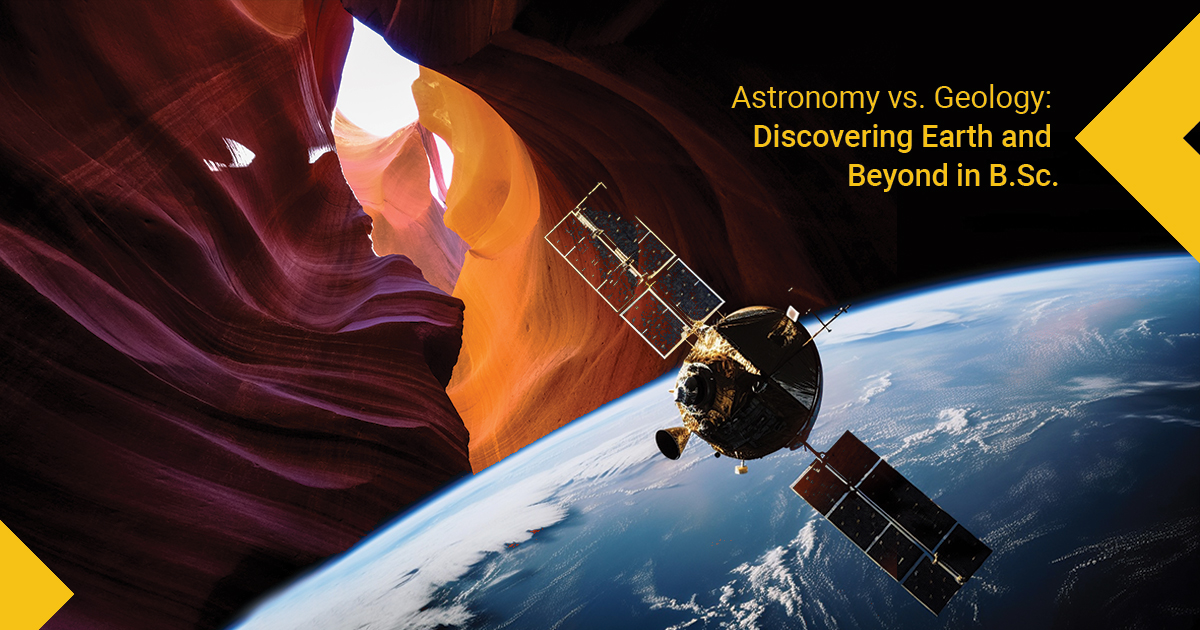Blog Detail


Astronomy vs. Geology: Discovering Earth and Beyond in B.Sc
24-09-2024

The study of astronomy is inclusive of everything that revolves around the universe except for the planet’s atmosphere. Students of astronomy research and analyse stars, celestial bodies, and cosmic entities as a whole. Astrophysics, observational astronomy, theoretical astronomy, and cosmology are interdisciplinary fields of astronomy.
The extensive study of Earth’s physical structure, composition, and history of the earth. Students of Geology are given enhanced practical exposure and study the planet’s surface and interior, doing a lot of field study, computer modelling, laboratory analysis, and more. The course dwells in the submerges in the study of Earth's dynamic processes and its interactions with the hydrosphere, atmosphere, and biosphere.
Astronomy Vs Geology: Course Duration and Eligibility
Both the courses of B.Sc Astronomy and B.Sc Geology have been designed for 3 years (6 semesters). These three years are inclusive of their internship tenure and major project along with theoretical and practical subject coaching and assessments.
Eligibility criteria for B.Sc Astronomy: 12th Grade Science Stream or equivalent studies completed with a percentage falling under the cut-offs as listed by the University.
Eligibility criteria for B.Sc Geology: 12th Grade Science Stream or equivalent studies completed with a percentage falling under the cut-offs as listed by the University.
Astronomy Vs Geology: Course Curriculum
Undergraduate, Post-graduate, and Diploma courses are available in the field of Astronomy and Geology. Below listed are the major subjects that are being studied:
Astronomy:
- Mathematics
- Mechanics
- Specials Relativity
- Properties of Matter
- Modern Physics
- Dynamics and Vector Calculus
- Linear algebra and calculus
- Practical Physics
- Galaxies
- Dynamics and Relativity
- Quantum mechanics
- Thermodynamics
Major Subjects for Geology:
- Sedimentary Petrology
- Metamorphic Petrology
- Igneous Petrology
- Mineralogy
- Optics
- Crystallography
Astronomy Vs Geology: Career Opportunities
Astrology and Geology are affiliated with multiple career options and below listed are some options to consider.
Career possibilities after Pursuing Astronomy
- Astrophysics: Primarily concerned with cosmic objects and their functional influence on the world
- Meteorologists: Engages in studying, observing, and forecasting the weather
- Aeronautics: Studies the science of flight and works in the respective field
Career Possibilities after Pursuing Geology
- Geologist: Studies the properties of elements in all its four states and its possible implying influence on earth
- Environmental Geology: Studies the interaction of humans with the environment and the various aspects revolving to the same
- Geophysicist: Studies and explores the physical aspects of the earth using a range of factors including gravity and conducts research
- Hydrogeologist: Works and carries research along with experts to efficiently take care of waste management, water conservation, and more
- Volcanologist: Collects data and carries out research to formulate results and strategies to protect the environment and reduce the impact
In Short
The scientific disciplines of Astronomy and Geology are interconnected yet can be distinguished variedly. The two respective fields focus on the study of celestial objects and other elements in detail. These two fields play a major role in understanding the concept of the universe and the dynamic processes having a major direct impact on the entire spatial functioning. These intersecting fields play a crucial role in contributing to the understanding of the Universe and the effectual processes that shape the celestial bodies and dictate the overall functioning of space.